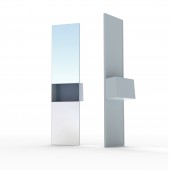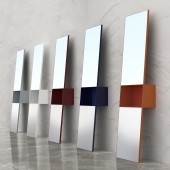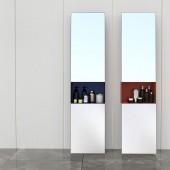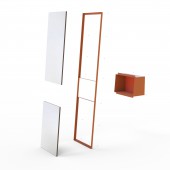
| THE AWARD |
| CATEGORIES |
| REGISTRATION |
| SUBMIT YOUR WORK |
| ENTRY INSTRUCTIONS |
| TERMS & CONDITIONS |
| PUBLICATIONS |
| DATES & FEES |
| METHODOLOGY |
| CONTACT |
| WINNERS |
| PRESS ROOM |
| GET INVOLVED |
| DESIGN PRIZE |
| DESIGN STORE |
| THE AWARD | JURY | CATEGORIES | REGISTRATION | PRESS | WINNERS | PUBLICATIONS | ENTRY INSTRUCTIONS |
Arca Mirror Shelf by Gensuke Kishi |
Home > Winners > Design #79895 >Interview |
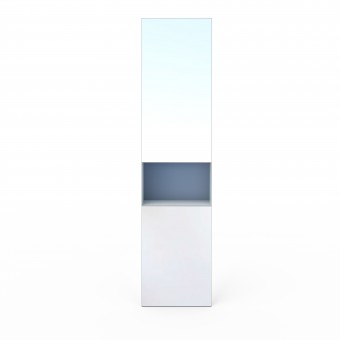 |
|
FS: What is the main principle, idea and inspiration behind your design?
GK: Modern people do not have time and are required to do everything quickly and easily. Every morning people arrange their hair, makeup, and put on clothes in front of the mirror. Since the full length mirror has a shelf, you can perform the necessary work more quickly and easily according to the purpose. Even if you are not sitting on the dresser, you can easily prepare it by standing. You can look at the mirror in a standing position and take out what you need from the box shelf.
FS: What has been your main focus in designing this work? Especially what did you want to achieve?
GK: It is a project to solve daily unconscious inconvenience. It is a project which is studying the structure which can be easily manufactured and assembled to satisfy the demands of modern people. The mirror is tilted, but the box is vertical to the wall. The bottom of the box in contact with the wall is angled to support the mirror at an appropriate angle. By bringing the wall into contact with the surface, not the point, the frictional force increases and prevents the mirror from falling.
FS: What are your future plans for this award winning design?
GK: This work is a design that has not been commercialized yet. I'm looking for a furniture brand that will contract with me to commercialize this design. Please contact the furniture company you are interested in.
FS: How long did it take you to design this particular concept?
GK: This design takes over 5 years of production time. It took trial and error to complete the simple structure and ideas.
FS: Why did you design this particular concept? Was this design commissioned or did you decide to pursuit an inspiration?
GK: This design was newly designed to exhibit at the A’ Design Award. Unlike everyday work, it is designed with my personal ideas.
FS: Is your design being produced or used by another company, or do you plan to sell or lease the production rights or do you intent to produce your work yourself?
GK: The design of has not yet been released and is designed entirely for the A' Design Award. The design is just finished, so I have no plans to create any company. I am looking for a furniture company that wants to commercialize this design. Please contact me.
FS: What made you design this particular type of work?
GK: I specialized in product and furniture design since I was a student. Currently I am designing space, furniture and products in an interior design studio. Also, as a personal activity, I do kitchenware product design, furniture design and so on. I hope that my new design comes out in the world with this A 'Design Award. Also, from now on I will work more actively as designers of products and furniture in the world.
FS: Where there any other designs and/or designers that helped the influence the design of your work?
GK: This design has a focus on the proportions of mirrors and boxes, and color variations. The first idea came from a musician's music video. I got inspiration from the sculptural works of contemporary artists to pursue the beauty of shape from there.
FS: Who is the target customer for his design?
GK: The target of my work is young people who feel inconvenient in their daily life, and people who have an interest in the design of the interior of the room. The structure is easy to assemble and easy to produce, so I would like to sell it not only to high-class people but also to many people who use this product with familiarity on a daily basis.
FS: What sets this design apart from other similar or resembling concepts?
GK: A similar product of this design is a dresser to sit on and a mirror with a shelf board. The biggest difference between these products and this design is that their shapes and roles are completely equal. The role of the box of this design is not only the role as a shelf that can be used while looking at the mirror. The bottom of the box is angled and has the role of supporting the mirror at an appropriate angle when it rests on the wall. The design with a steel box embedded in the sight mirror has never been seen before and attracts people's attention. And each form of design has an indispensable role and it is beautiful without waste.
FS: How did you come up with the name for this design? What does it mean?
GK: Arca means Box in Latin. I named it Arca mirror shelf from the design where the box is embedded in the full-length mirror.
FS: Which design tools did you use when you were working on this project?
GK: Rhinoceros Flamingo vectorwoks Adobe Illustrator Adobe Photoshop
FS: What is the most unique aspect of your design?
GK: A box is embedded in the surface of the full-length mirror. Mirror and box shelf are integrated. The bottom of the box is in contact with the wall and supports the mirror while maintaining the proper angle. Because there are mirror surfaces on the upper side and the lower side of the box, the mirror surface reflects the scenery around and the box seems to be floating. It is a design that has a role as a dresser that can be used while standing up looking at the mirror.
FS: Who did you collaborate with for this design? Did you work with people with technical / specialized skills?
GK: By the time I made this design, I designed furniture and lighting for installation in spaces such as beauty salons and restaurants. In that space, I designed several mirrors and shelves involved in the inspiration of this design. When designing a mirror or shelf, I kept in touch with a professional craftsman through drawings and discussed how to make many times.
FS: What is the role of technology in this particular design?
GK: The material is steel, mirror glass, Mdf panel. It is a very simple structure with steel box and frame with powder coat. The frame consists of L angles, and the mdf panel to which the mirror glass is attached is fixed with the screw from the back. Screw the mirror from the back of the frame where the steel box is embedded. Everyone can be easily assembled. With this structure, the inside of the box and the surface of the frame are smooth and seamless without screw holes. The simple construction is the result of the craftsmanship and experience.
FS: Is your design influenced by data or analytical research in any way? What kind of research did you conduct for making this design?
GK: The height of the mirror and the position of the box are in the golden ratio. The height of this mirror and the position of the box were determined by trial manufacture many times. In addition, the optimum angle for tilting the mirror was also calculated from the actual viewing angle of the full-length mirror and the stand mirror. While the size is enough as a full-length mirror, I decided on the size that could be placed in a room where only one person lives. However,the mirror is cheap if it is small, so I chose a size one size larger than a normal look.
FS: What are some of the challenges you faced during the design/realization of your concept?
GK: The most difficult point in the creation of this project is the determination of the optimum proportion and color scheme. I thought about changing the color of the sides of the box and the bottom of the box to make use of the brilliant beauty of steel powder paint. It is not a single color, it is a color scheme that seems to have depth in the box by changing saturation and lightness.
FS: How did you decide to submit your design to an international design competition?
GK: I have participated in numerous competitions so far. Most are done in Japan. Since I want to work as a designer around the world, I think it is very important to participate in large international competitions such as A 'Design Award. This time I was able to go to Italy because I received the bronze award for A 'Design Award. I went to Italy for the first time, but I had a very important time for me because I met many people and had never experienced before.
FS: What did you learn or how did you improve yourself during the designing of this work?
GK: Importance of shape proportions in the design. And the importance of the impression that color variation gives. Until then I have considered what is important in design is role and shape, and an unprecedented idea. I learned that in order to commercialize a product, it is also necessary to consider an easy-to-assemble structure and a simple mechanism.
FS: Any other things you would like to cover that have not been covered in these questions?
GK: There are many young designers in the world who can not release their designs to the world for economic and environmental reasons. Design competition is a hope for these people and an important opportunity to get a chance. We believe that as the network has developed, people and people around the world are given opportunities and possibilities. I also participate in many design competitions, hoping to send out creative and innovative designs to the world. In fact, there are a number of projects that have won awards for design competition and are moving to commercialization. This kind of design competition is very important for us young designers, and we believe that unannounced, unmarketed designs are the greatest opportunity to appear in the world. The discovery of many unknown new designs brings significant benefits to the world. I would like to commercialize the winning work of this competition.
FS: Thank you for providing us with this opportunity to interview you.
A' Design Award and Competitions grants rights to press members and bloggers to use parts of this interview. This interview is provided as it is; DesignPRWire and A' Design Award and Competitions cannot be held responsible for the answers given by participating designers.
| SOCIAL |
| + Add to Likes / Favorites | Send to My Email | Comment | View Press-Release |
